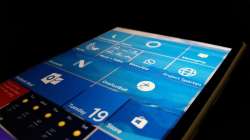Windows phones dead, Microsoft finally admits
Microsoft finally admits what we knew for a year now. Even Bill Gates had switched to Android platform. RIP Windows phones.

Failing to sell Windows smartphones for quite some time as Google's Android and Apple iOS Operating Systems (OS) surged way ahead, Microsoft has finally admitted that it will no longer develop features or hardware for Windows 10 mobiles.
A few months back, Microsoft ended support for its Windows Phone 8.1 platform. However, that version was succeeded by Windows 10 Mobile—a more handset-friendly version of Microsoft’s desktop operating system.
In a series of tweets, Joe Belfiore, Corporate Vice President in the Operating Systems Group at Microsoft, has revealed that the Windows operating system will only help with bug fixes and security updates for the existing users.
"Of course we'll continue to support the platform.. bug fixes, security updates. But building new features/hw [hardware] aren't the focus," Belfiore tweeted late on Sunday.
Belfiore, who himself has switched to Android, advised Windows users to move to Android or iOS or any other platform that makes sense for them.
"As an individual end-user, I switched platforms for the app/hw diversity. We will support those users too! Choose what's best 4 u," he tweeted.
Bill Gates has already stopped using Windows phone.
The devices that currently use Windows OS are HP Elite x3, Microsoft Lumia 950 XL, Microsoft Lumia 950 and Nokia Lumia 930, among others.
HP Inc is also halting production of its flagship Windows handset. The company recently said it won't add any new handset to its existing "Elite" Windows smartphone lineup.
Belfiore also admitted that Microsoft will still support Windows 10 customers who want to use Android and iOS on their phones.
"We have tried very hard to incent app devs. Paid money.. wrote apps 4 them.. but volume of users is too low for most companies to invest," Belfiore posted.
According to market research firm Kantar, Windows phones account for just 1.3 per cent of the market -- from 2.4 per cent last year -- in the US.
Even though Microsoft has reported a fall in Surface PC line and Windows phones revenues, the Redmond-based tech giant is reportedly aiming for new devices called "Surface Phones" and has made its patent public.
According to media reports, India-born Microsoft CEO Satya Nadella has confirmed that Microsoft will "make more phones, but they will not look like phones that are there today."
It appears that Microsoft is not cut for the smartphone market.
In his recently-launched book "Hit Refresh," Nadella revealed that he was against the idea of purchasing Nokia in 2013 -- a deal that was finally proved wrong.
Microsoft purchased Nokia for $7.9 billion in 2013.
In mid-2016, Microsoft sold its feature phone business and rights to use the Nokia brand to Finnish firm HMD Global -- laying off thousands in the process.
Nadella, in his book, said his biggest disappointment was its human cost. "In retrospect, what I regret most is the impact these layoffs had on very talented, passionate people in our phone division," Nadella wrote.
Microsoft is set to roll out the "Fall Creators" update for Windows 10 on October 17 which will include Virtual Reality (VR) and Mixed Reality (MR) support sans the mobile experience.
(With IANS inputs)